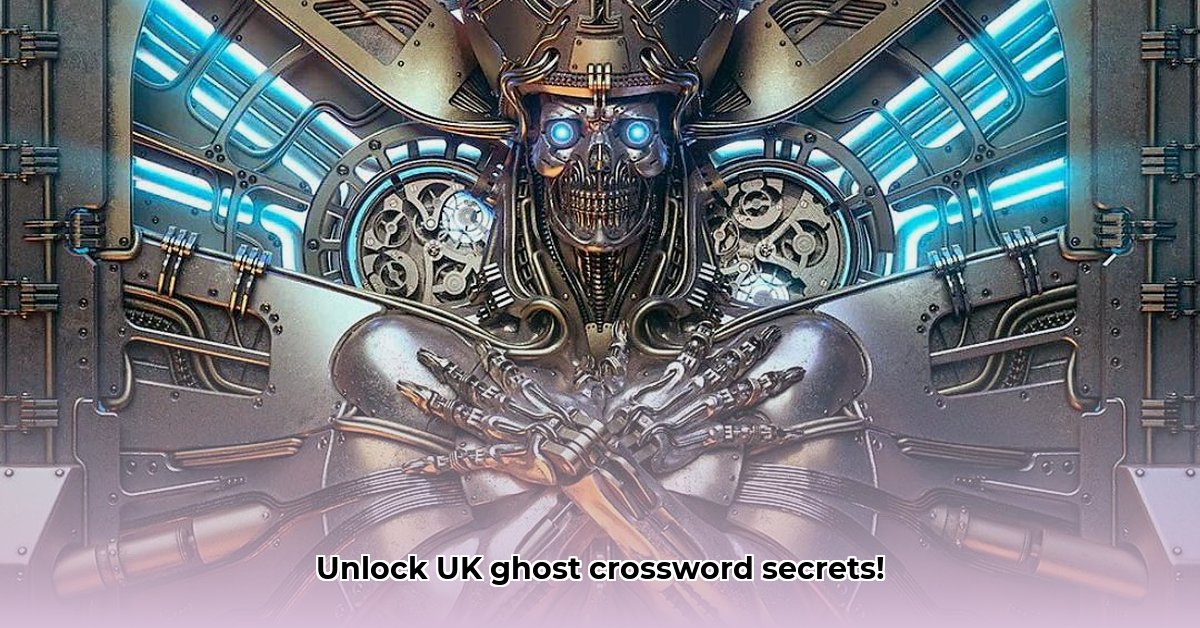Stuck on a crossword clue that simply reads “Ghost”? These can be deceptively tricky! The word itself is loaded with potential answers, leading to serious frustration. This comprehensive guide provides the most common solutions, emphasizes the context within the puzzle, and offers smart strategies to crack the code. For even more tips, check out this helpful guide: Ghost Crossword Clues. Whether you’re a crossword novice or a seasoned expert, you’ll gain the tools to conquer those elusive “Ghost” clues and become a true crossword champion. From obvious answers like “spook” to advanced deduction techniques using surrounding clues, we’ll cover it all. Let’s dive in and start solving!
Ghost Crossword Clue: Top Answers & Strategies
Tackling a “ghost” clue can sometimes feel like chasing shadows, but with the right knowledge, you can consistently find the correct answer. The beauty (and challenge) of the word “ghost” lies in its ambiguity, capable of representing numerous concepts. Let’s demystify the process and equip you with strategies to dominate “ghost” crossword clues.
Common Solutions: Unmasking the Prime Suspects
The most common answers for a “ghost” clue are heavily dependent on one crucial factor: the number of letters required.
Shorter answers, often found in easier puzzles, frequently include:
- SPOOK
- SHADE
- SPIRIT
These are popular choices because they represent well-known synonyms for “ghost” and easily integrate into crossword grids.
However, more challenging puzzles often require longer, more evocative solutions like:
- SPECTRE
- PHANTOM
- APPARITION
- WRAITH
The key takeaway is that the crossword grid’s size is the primary determinant of your potential solutions.
Context as Your Ally: Deciphering the Surrounding Clues
Never approach a “ghost” clue in isolation. Crosswords, especially cryptic ones, thrive on context. Scrutinize the adjacent clues and intersecting squares. What letters have you already revealed by solving other clues? These existing letters can be invaluable.
Consider it a detective’s investigation: each letter acts as a vital piece of evidence. If an intersecting clue has already filled in an ‘O’ as the second letter, this instantly eliminates SPECTRE and APPARITION, but keeps SPOOK as a strong possibility. This process relies on careful deduction.
A Structured Approach to Ghostly Success: A Step-by-Step Guide
Let’s formalize this into a systematic approach:
Step 1: Count the Letters: Before any brainstorming begins, determine the exact number of letters required for the “ghost” clue. A three-letter answer presents an entirely different challenge than an eleven-letter one. This immediately shrinks the pool of potential solutions.
Step 2: Leverage Intersections: Exploit previously solved answers that intersect with the “ghost” clue. The letters already in place can eliminate numerous words, potentially narrowing the options down to just one or two.
Step 3: Expand Beyond the Supernatural: While “ghost” commonly evokes the paranormal, cryptic clues excel at misdirection. Consider alternative meanings. “Ghost” can represent a faint impression, a pale image, or even an absent presence. ‘Shadow’, for instance, can indicate a subtle hint of something. As another example, consider “ghosting” someone – suddenly cutting off all contact.
Step 4: Strategic Use of Online Solvers: Online crossword solvers can be useful aids, but avoid relying on them exclusively. Use them to validate your potential solutions, not to circumvent the thought process entirely. They are most effective as a final confirmation tool, not a shortcut.
Step 5: Embrace Figurative Language: Cryptic crosswords often employ wordplay. Is “ghost” used metaphorically, as a pun, or in some other concealed manner within the clue’s wording? Deciphering these hidden meanings is part of the puzzle’s enjoyment. Is the clue hinting at a “ghost writer?”
Advanced Ghost Hunting: Elevating Your Techniques
For particularly intricate “ghost” clues, incorporate these advanced strategies into your repertoire:
-
Anagram Detection: Closely examine the letters within the clue itself. Could they be rearranged to form a word associated with ghosts? Sometimes, the answer is literally present, but scrambled.
-
Hidden Word Identification: Occasionally, the answer isn’t a direct synonym, but a word cleverly hidden within the clue’s text. Scrutinize the clue carefully; the solution might be embedded in the wording. For example, the clue “Ghost town terror” could indicate “TOWN” as the answer.
-
Compound Word Dissection: Could the solution be a combination of two words, both related to the concept of “ghost?” Consider “POLTERGEIST,” “GHOST TOWN,” or “GHOST BUSTER.”
A Practical Reference for Ghostly Answers
Here’s a handy guide to aid in selecting the appropriate word, based on its length. Keep in mind that this is only a partial list, and word associations can vary.
| Solution | Length | Typical Crossword Difficulty | Possible Contexts |
|---|---|---|---|
| HINT | 4 | Very Easy | Trace, Suggestion, Indication |
| SPOOK | 5 | Easy | Supernatural, Fright, Scare, Jolt |
| SHADE | 5 | Easy | Shadow, Hint, Subtle Suggestion, Degree of Darkness |
| SPIRIT | 6 | Medium | Supernatural, Essence, Soul, True Nature, Mood |
| SPECTER | 7 | Medium | Supernatural, Apparition, Haunting, Phantom |
| PHANTOM | 7 | Medium | Illusion, Unseen, Intangible, Ghostly Image |
| APPARITION | 10 | Hard | Supernatural Manifestation, Sudden Appearance, Vision |
| POLTERGEIST | 11 | Hard | Noisy Ghost, Mischievous Spirit, Disturbance |
Beyond the Clue: The Cultural Significance of Ghosts
Crossword clues, even those as simple as “ghost,” can offer a glimpse into cultural beliefs and folklore. The enduring fascination with ghosts transcends borders, appearing in literature, film, and art worldwide. Understanding these cultural nuances can sometimes provide a subtle edge when tackling a particularly challenging clue. For instance, knowledge of traditional ghost stories or famous haunted locations might unlock a hidden connection.
Practice Makes Perfect: Sharpening Your Skills
Solving “ghost” clues effectively requires a combination of logical reasoning and imaginative thinking. It’s not just about identifying the “correct” answer; the mental journey itself is part of the satisfaction. Developing this skill takes consistent practice and patience, but the reward of cracking a particularly complex clue makes it all worthwhile. So, keep practicing, and you’ll be a master of “ghost”-busting crosswords in no time.
- Handsome Good Morning Message for Him Long Distance to Make Him Smile - January 9, 2026
- Find the Perfect Good Morning Handsome Gif for Him - January 8, 2026
- Have a Good Day Handsome Texts Matter to Him - January 7, 2026










